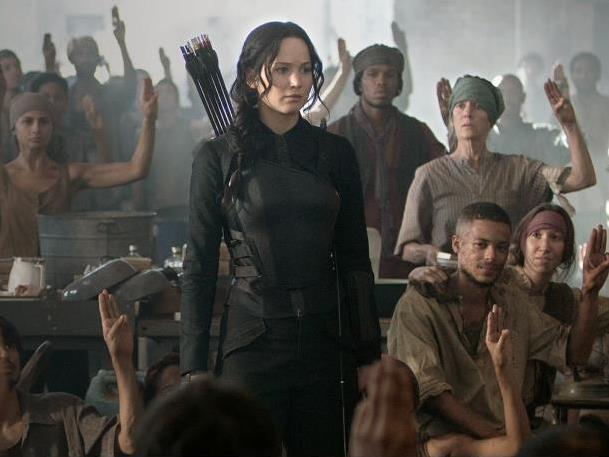With crying pleas and hazy confusion, The Hunger Games: Mockingjay – Part 1 starts abruptly. Catering for the already initiated only, the film dives straight into its established dystopian world, where the divide between the haves and the have-nots has branched beyond the point of pitting teenagers against each other for sport. As so perfectly inhabited with a combination of externalised pluck and internalised reticence by star Jennifer Lawrence (American Hustle), its heroine and symbol of hope, Katniss, has been forced to actively embrace her role as an emblem and an inspiration to lead the disenfranchised out of their dismal existence. And yet, costs and consequences colour both sides, as do tactics of mobilisation and manoeuvring.
In an effort that ranks third in a four-film franchise, a narrative telling only the first half of a story that comprised a single novel, and a movie adaptation of a best-selling book series that comes complete with an in-built fan base, the feature’s immediate immersion is to be expected. That the film ends in the same manner is similarly unsurprising, as is the resolution-free nature of the content that sustains the feature’s 123-minute running time. In doing so, the first instalment of Mockingjay mirrors the predicament and perspective of its protagonist. From the outset, Katniss has been reluctantly thrust into troubles not of her own making, and jarringly subjected to constant manipulation at every turn. It may act as a placeholder for the confrontation and catharsis sure to follow in the series final screen outing; however the insightful and intelligent current offering is perhaps the first film to truly embody Katniss’ mindset.
Here, what was packaged as a folly in The Hunger Games, and then shown as a farce in sequel Catching Fire, has now been unveiled as a proper war with all that that entails. Overt pretence and theatricality have been stripped away as two presidents vie for the allegiance of the populace: the ruthless Snow (Donald Sutherland, The Calling), comfortable in the Capitol with Katniss’ former partner-in-tribute Peeta (Josh Hutcherson, Red Dawn) trapped by his side, versus the resourceful Coin (Julianne Moore, Maps to the Stars), leader of the rebels in the forsaken District 13. It is with the latter that Katniss is aligned, courtesy of the intervention of former insider Plutarch (Philip Seymour Hoffman, A Most Wanted Man) and the loyalty of her childhood friend Gale (Liam Hemsworth, Paranoia). Now, Katniss must struggle for survival in a real situation of combat, as an icon of revolution in a full-scale fight against a system of domination, destruction, cruelty and control.
Carnage may have been the main attraction in earlier efforts, but what worked so well in this film’s predecessors was the strong sense of its titular term – the game at play, in many more ways than just the obvious. Even with the last feature offering an unfulfilling rehash designed to set up the franchise’s culmination, the underlying playing with propaganda, politics, packaging and presentation was always smartly conveyed. Indeed, many thematic imitators have been spawned in the series’ wake; however the societal commentary remains at its most potent in the screen iterations of Suzanne Collins’ young adult literature creations, here explored to blistering and brutal ends in writers Peter Craig (The Town) and Danny Strong’s (The Butler) adaptation. Ever enterprising, Katniss has awakened to the truth of her position and her problematic surroundings several times before, yet never with the force and fury awakened by the knowledge that whatever the rationale, her role remains nothing more than a pawn. It’s a revelation that primes the character and the content for a powerful final chapter.
Accordingly, directed with frenetic efficiency and shot with the dour and dank in mind by returning helmer Francis Lawrence (Water for Elephants) and cinematographer Jo Willems (Limitless), Mockingjay – Part 1 is a mirthless affair, valuing contemplation over action and speeches over spectacle. In reflective rather than reactive mode, rampant tension is cultivated at the expense of character, comedy comes only from familiarity with the eccentricities of supporting players (The Lego Movie’s Elizabeth Banks, True Detective’s Woody Harrelson and Transformers: Age of Extinction’s Stanley Tucci, chiefly), and stunning visual displays are few and far between. Yet, in a movie predicated upon coming to terms with the reality behind the façade on both sides of the ideological divide, such an approach is always fitting. The ever-effective efforts of the excellent ensemble cast, the gravitas of the late Hoffman included, intertwine with an insular but astute rendering of the material that has reached the radicalised point of no return as it inches towards its conclusion.
Rating: 3.5 stars out of 5
The Hunger Games: Mockingjay – Part 1
Director: Francis Lawrence
USA, 2014, 123 mins
Release date: November 20
Distributor: Roadshow
Rated: M
Actors:
Director:
Format:
Country:
Release:





